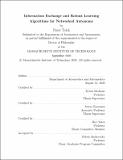Information exchange and robust learning algorithms for networked autonomy
Author(s)
Talak, Rajat(Rajat R.)
Download1227276801-MIT.pdf (3.190Mb)
Other Contributors
Massachusetts Institute of Technology. Department of Aeronautics and Astronautics.
Advisor
Eytan Modiano and Sertac Karaman.
Terms of use
Metadata
Show full item recordAbstract
Networked autonomy deals with problems in which several autonomous agents interact via a communication network to cooperatively perform intelligent tasks. Networked autonomous systems operate in a constantly changing, real-world environment and thus have to constantly apprise themselves of the changing state of the world and other autonomous agents in the network. The autonomous agents have to do this by consistently exchanging information via the communication network. The first part of this thesis deals with the problems of optimizing information freshness in wireless communication networks formed by autonomous agents. We argue why Age-of-Information is a good metric for information freshness, show how it fundamentally differs from a traditional latency metric of packet delay, and devise several policies to minimize Age-of-Information in wireless communication networks. We consider single-hop as well as multi-hop communication networks. We provide theoretical guarantees on the performance of the proposed policies. The autonomous systems also have to estimate their locations and construct a map of their shared environment. The estimated map and locations must be robust to outliers and model parameters, hardware failures, unknown system dynamics for a fail-safe, long-term operation of the networked system. In the second part of the thesis, we propose a new theory of uncertainty variables which provides a mathematical framework for performing set-estimation over complex graphical models. An uncertainty variable is characterized by an uncertainty set, in which its realization is bound to lie, while the conditional uncertainty is characterized by a set map. We prove Bayes' law and the law of total probability equivalents for uncertainty variables. We then develop notions of independence, conditional independence, and graphical models over a collection of uncertainty variables. We propose belief propagation algorithms with provable performance guarantees for set-estimation, which can be used for localization, mapping, high-level perception and planning in networked autonomous systems.
Description
Thesis: Ph. D., Massachusetts Institute of Technology, Department of Aeronautics and Astronautics, September, 2020 Cataloged from student-submitted PDF of thesis. Includes bibliographical references (pages 249-261).
Date issued
2020Department
Massachusetts Institute of Technology. Department of Aeronautics and AstronauticsPublisher
Massachusetts Institute of Technology
Keywords
Aeronautics and Astronautics.